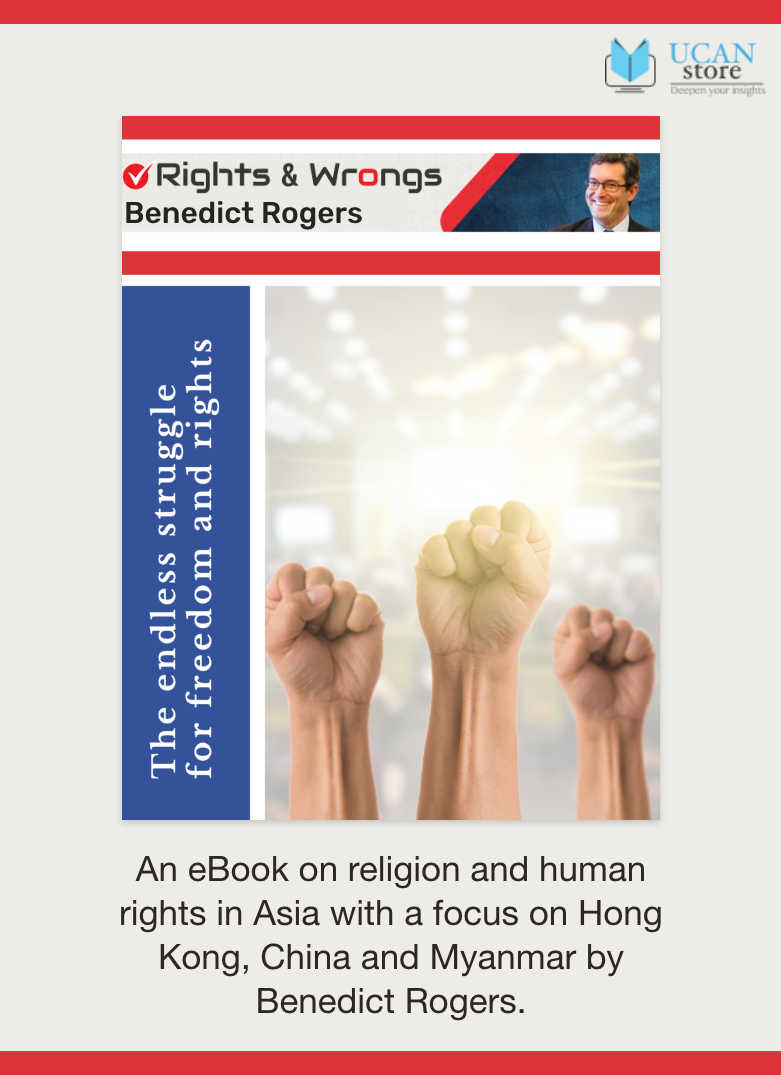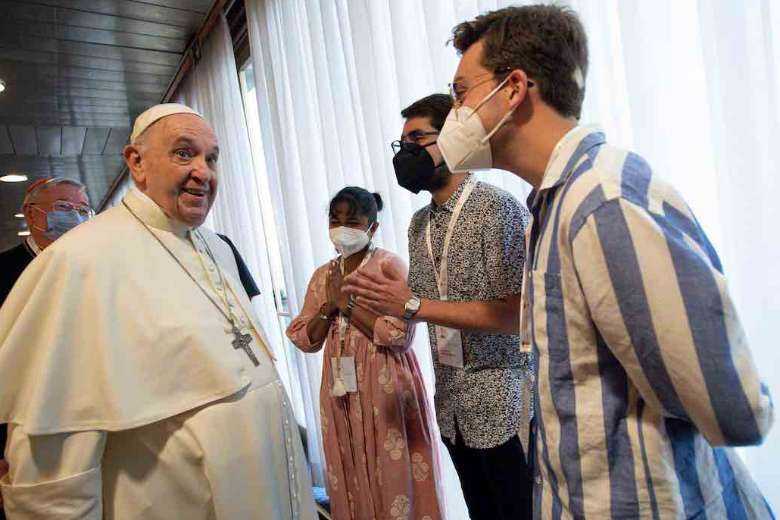
By baptism all Catholics are equal and all are expected to cooperate in the exercise of the power in the Church

Pope Francis chats during the opening of the Synod of Bishops at the Vatican on Oct. 9, 2021. (Photo: Vatican Media/AFP)
The Catholic Church's hierarchy should undergo deep structural changes and share administrative powers with all Catholics if it wants to create a synodal Church as envisioned by Pope Francis, says a senior theologian.
Theologian Father Felix Wilfred, former secretary of the theological advisory committee of the Federation of Asian Bishops’ Conferences (FABC), was presenting a keynote address at a seminar on synodality in India before some 600 Catholic leaders, theologians and scholars.
The synodality that Pope Francis is stressing calls for “a transition from the synodal of bishops as an institution to the synodal Church” as a way of being. It needs “deep structural changes” and should address “major theological issues,” Father Wilfred said.
“Synodality is the key concept in the ecclesiology of Pope Francis and the way for the Church in the third millennium. Pope Francis proposes a macro vision, a 1,000-year program for the Church in the third millennium,” he said.
At least 57 papers were presented at the March 21-23 program organized by the Missiology department of St. Peter’s seminary in Bengaluru, capital of Karnataka state.
The 74-year-old theologian, who has been a member of the Vatican’s International Theological Commission, made a series of recommendations, insisting that the Indian Church needs to change radically to embody Pope Francis’ vision for a synodal Church.
“When the spirit of synodality is practiced, it would make the Church an inverted pyramid. Canon law needs to undergo a thorough change, as the present code (129) states clearly that the power of governance is reserved for those in sacred orders," he said.
Through baptism, everyone is made equal and all Catholics are expected to cooperate in the exercise of the power, Father Wilfred said.
He questioned the Indian Church continuing to have two different synodal structures — Eastern and Latin — despite both having the same socio, cultural and economic contexts.
“The synodal spirit should become part of our everyday life. We must begin to live synodally. The goal of the synodal process is not an intellectual exercise but a spiritual experience”
The Indian Church comprises two Eastern-rite churches of Syro-Malabar and Syro-Malankara that claim the apostolic tradition of St. Thomas, and the Latin-rite church introduced by the Portuguese in the 16th century.
Each Eastern-rite Church has its own bishops’ synod and the Latin bishops have a seperate bishops’ conference. Indian bishops of all three rites together are members of a fourth body called the Catholic Bishops’ Conference of India.
Father Wilfred told the Bangalore gathering, which included bishops and seminary professors, that until the Council of Trent, provincial councils decided even the appointment of the bishops in communion with the pope.
“So, we must be able to think, decide and act by ourselves,” he said.
He suggested that just like every nation has its constitution, the Church must have its foundational law (lex ecclesiae fundamentalis) and its legal system needs to be reformed as well.
“The three powers, legislative, executive, and judicial powers are concentrated in a single office. This does not contribute to the synodal practice (in the church),” the theologian noted.
Archbishop Peter Machado of Bangalore, who opened the conference, said Pope Francis wants a Church that is “not just preaching but also listening and discerning.”
The prelate told participants to avoid three risks, as identified by Pope Francis, that can block the synodal process – formalism, intellectualism, and immobilism.
Archbishop Felix Machado of Vasai said it is outdated to think that a synod is an event that happens at some point in the history of the Church.
“The synodal spirit should become part of our everyday life. We must begin to live synodally. The goal of the synodal process is not an intellectual exercise but a spiritual experience,” said Archbishop Machado, secretary-general of the Catholic Bishops’ Conference of India (CBCI).
Help us keep UCA News independent
The Church in Asia needs objective and independent journalism to speak the truth about the Church and the state.
With a network of professionally qualified journalists and editors across Asia, UCA News is just about meeting that need. But professionalism does not come cheap. We depend on you, our readers, to help maintain our independence and seek that truth.
A small donation of US$2 a month would make a big difference in our quest to achieve our goal.

Share your comments